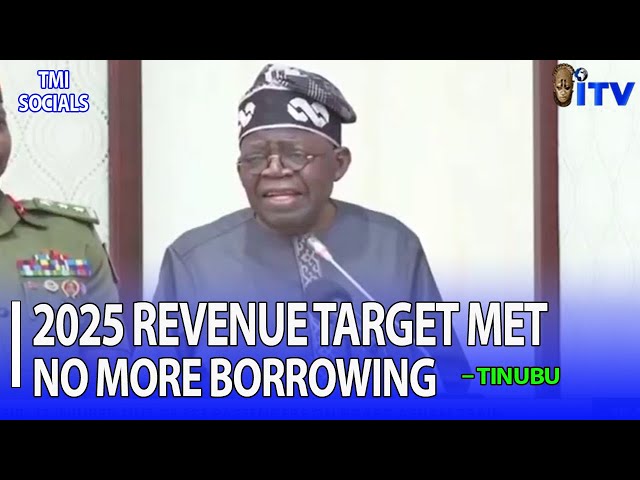Draped in the glow of self-congratulation, President Bola Tinubu recently declared that Nigeria had already met its 2025 revenue target. “We have met our revenue target for the whole year, and we met it in August. Nigeria is not borrowing a dime from local banks,” the president boasted, adding: “The economy is stabilized; nobody is trading pieces of paper for exchange rate anymore.” Yet beneath the vaunted numbers lies a nation gasping under inflation, stagnant growth, and structural fragility. This isn’t victory; it is a grim carnival, with families crushed by inflation, joblessness, and hunger while the president dances on spreadsheets. This is not triumph; it is theater, and the Nigerian people are the unpaid extra stage props.
Speaking at the Presidential Villa in Abuja during a meeting with former members of the defunct Congress for Progressive Change (CPC), the president stood before a gilded mirage, trumpeting that Nigeria has met its 2025 revenue target four months early – no local borrowing, he asserted, no economic collapse. He said non-oil revenues had provided a buffer against external shocks, adding that the naira had gained ground, strengthening from 1,900 to 1,450 to the US dollar. Tinubu outlined plans for nationwide agricultural mechanization, which he described as key to achieving food security and reducing poverty. “If we remove hunger, we have defeated poverty,” he said, linking the initiative to his administration’s Renewed Hope Agenda focused on jobs, exports and industrial growth.
Tinubu’s boast rings hollow when 22.6% of Nigerians face unemployment. Nearly one in four adults remains jobless, trapped in limbo, even as officials pretend that prosperity has arrived early. Yes, headline inflation dipped to around 21.9% by mid-2025, according to a recent Price Waterhouse Cooper (PwC) insight on Nigeria’s economic outlook. But the price of a pot of jollof rice soared to ₦27,528 – over 40% of the new minimum wage – while two-thirds of households struggle to put food on the table. How hollow is your “success,” Mr. President, when mothers skip meals to feed their children?
Tinubu’s proud proclamation rests heavily on non-oil gains. But while revenue may tick upward, ordinary Nigerians are sinking deeper. Inflation remains stubbornly high, with food prices well above 30%, even as wage stagnates and poverty deepens. Growth itself feels brittle, rebooted only through statistical wizardry. Q1 2025 GDP rose by a modest 3.13% year-on-year, lifted by a rebasing that inflated figures by 30%. Nigeria now projects a paltry 3-3.6% growth between 2025-2027; hardly a foundation for buoyant optimism. Because of the GDP rebasing, Nigeria’s debt-to-GDP ratio appears to have dropped from 52% to 40%. But the mirage vanishes under scrutiny: public debt jumped from ₦121.7 trillion to ₦149.4 trillion in just one year – a staggering 22.8% surge in Q1 2025. Despite the veneer of improvement, the country remains shackled by debt.
The IMF has already warned that Tinubu’s budget was built on fairy-tale assumptions. It unrealistically relied on crude oil at $75 per barrel; and optimistic tame inflation and exchange-rate projections of a naira at ₦1,400 to the dollar. Reality laughed. Oil currently hovers at $68, inflation still sprains most household budgets, and price pressures persist unabated. According to the World Bank, almost half of Nigerians (49.9%) live below the poverty line of $2.15 a day. The government’s figures may show revenue success, but they fail to reflect the escalating despair among the poor. The unfinished business of subsidy removal, curtailed capital spending, and overdrafts on social welfare continue to corrode trust in his numbers.
Even the World Bank’s scant applause is tempered with concern. Though government revenue rose by 4.5% of GDP and the fiscal deficit narrowed from 5.4% to 3%, inflation and poverty remain unyielding.
In short: meeting revenue targets is commendable. But it is not redemption. If the arithmetic of Abuja deceives, the ethics cannot. Nigerians cannot eat statistics, or pay school fees or rent with applause lines about fiscal prudence.
Mr. President, meeting numbers is not leadership; let us see your revenue. Nigerians are not dazzled by the stage lights. True victory lies in visible relief, not invisible charts. True triumph lies in nourishing those whose voices you claim to uplift. Your revenue “target met” rings like a clarion call, if only the warlords of hardship didn’t still occupy every household. You spoke of stability; but 22.6% of Nigerians are unemployed, and families are choosing between hunger and despair. Until your victories translate into bread, dignity, and hope; your metrics are nothing but empty noise without meaning.





